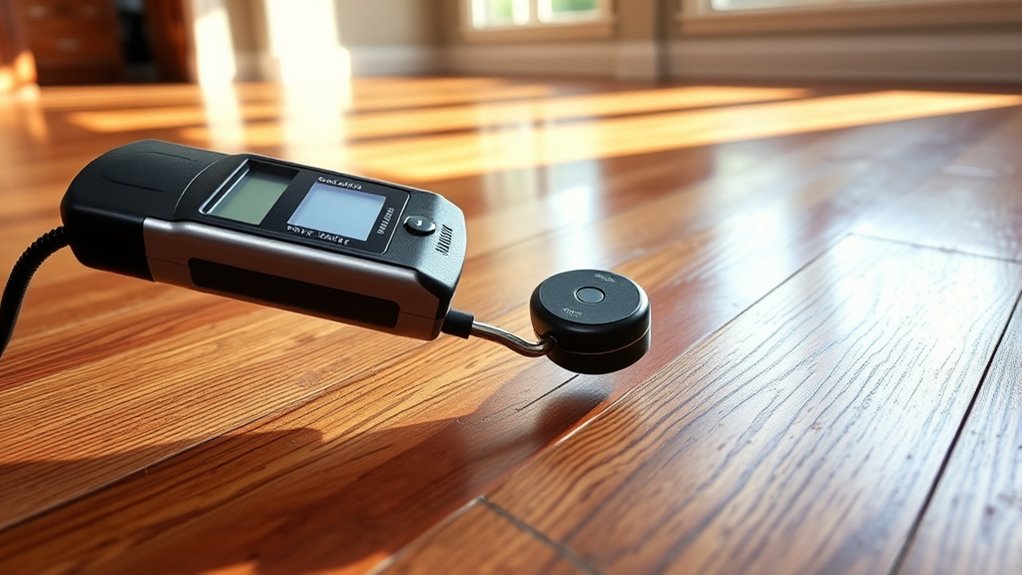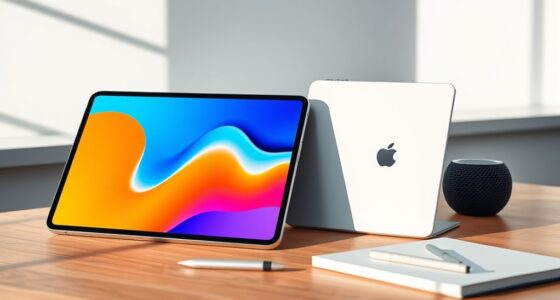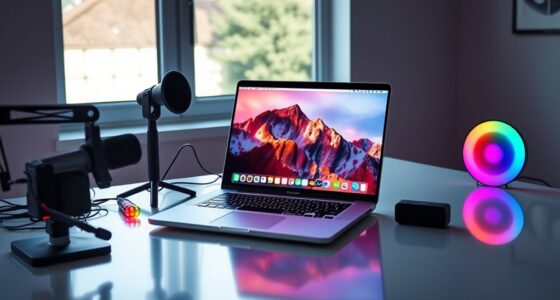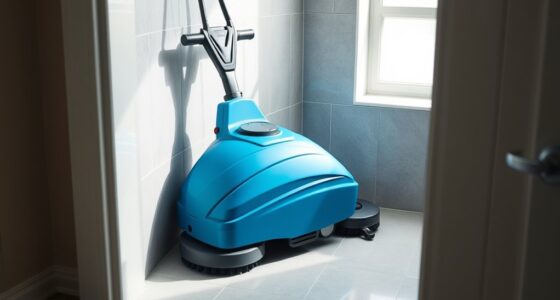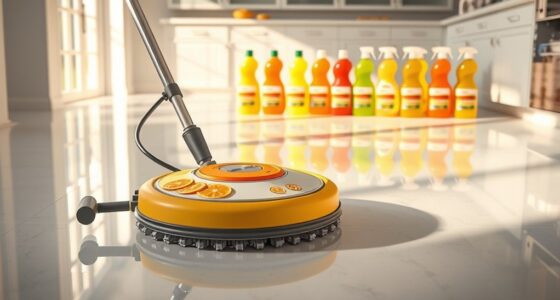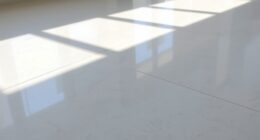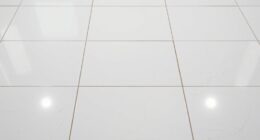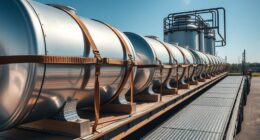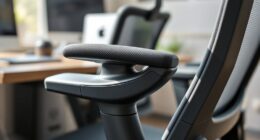If you’re looking for the best handheld moisture meters for floors, I recommend considering options like the Extech MO750, Klein ET140, and Floor Sentry, which offer reliable readings, versatile measurement depths, and user-friendly features. These devices are ideal for checking wood, drywall, or concrete to prevent warping or mold. By choosing the right tool, you’ll guarantee your floors stay durable and damage-free. Keep exploring to find the perfect meter for your needs.
Key Takeaways
- Choose models with pinless sensors for non-invasive, surface-friendly moisture readings in floors.
- Prioritize devices with deep measurement capabilities up to 3/4 inch for accurate sub-surface detection.
- Look for meters featuring multiple calibration modes tailored for different flooring materials.
- Opt for easy-to-read displays, LED indicators, and user-friendly controls for quick, reliable results.
- Consider durability, waterproof housing, and Bluetooth connectivity for professional, long-term floor monitoring.
Extech MO750 Soil Moisture Meter
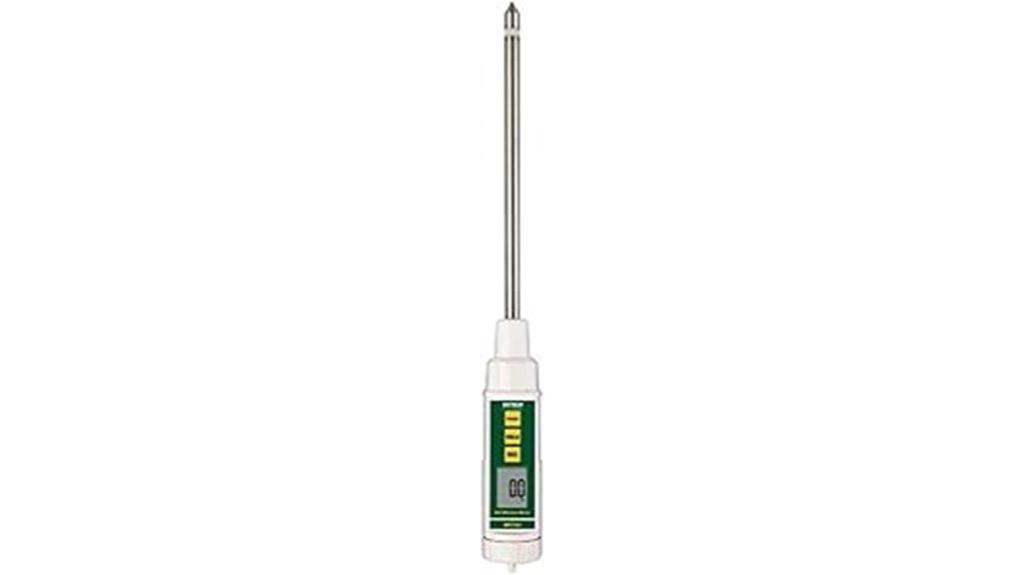
If you’re looking for a reliable and easy-to-use soil moisture meter, the Extech MO750 stands out with its integrated 8 heavy-duty probes and one-hand operation design. I find it simple to get accurate readings quickly, thanks to the large LCD display and water-resistant housing. The device measures soil moisture from 0 to 50%, helping me determine the right watering levels. Its data hold and min/max functions make monitoring easy, whether for gardening or landscaping projects. Plus, the durable build ensures it withstands outdoor conditions, giving me confidence in its long-term performance. Overall, it’s a practical tool for ensuring healthy plants and ideal watering.
Best For: gardening enthusiasts, landscapers, and professionals seeking a durable, easy-to-use soil moisture meter for accurate plant watering.
Pros:
- Integrated 8 heavy-duty probes for quick and reliable readings
- Large LCD display with data hold and min/max functions for easy monitoring
- Water-resistant housing suitable for outdoor use and harsh conditions
Cons:
- No standard reference tables for interpreting moisture percentage readings
- Requires 4 AAA batteries, which may need replacement over time
- Limited to measuring moisture from 0 to 50%, not suitable for very dry or overly saturated soils
Floor Sentry by Wagner Meters – Wood Floor Moisture & Temperature Sensor
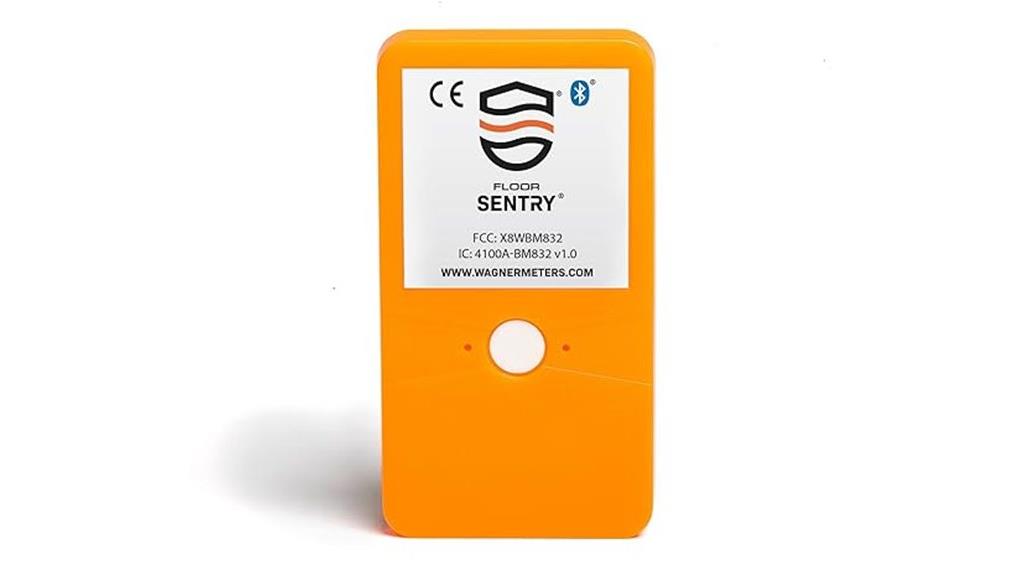
Floor Sentry by Wagner Meters is an ideal choice for homeowners and contractors seeking a reliable, long-term moisture and temperature monitoring solution for hardwood floors. It transforms floors into smart systems by providing real-time alerts on humidity and temperature, helping prevent costly issues like warping or cracking. The device fits into a cavity underneath each plank during installation, offering timestamped readings for both the wood and subfloor, including concrete. Controlled via Bluetooth with an intuitive app, it’s easy to monitor conditions and detect leaks early. While battery life is impressive, accessing and replacing the sealed battery can be tricky. Overall, it’s a practical, effective tool for protecting valuable flooring investments.
Best For: homeowners and contractors looking for a reliable, long-term moisture and temperature monitoring system to protect hardwood floors from damage.
Pros:
- Provides real-time, timestamped moisture and temperature readings for proactive maintenance
- Easy to install during new flooring projects with a seamless, compact design
- User-friendly app with Bluetooth connectivity for instant monitoring and alerts
Cons:
- Battery replacement can be difficult and may compromise water resistance due to minor disassembly required
- Limited notification options, relying mainly on Bluetooth-connected app alerts, which may not be ideal for immediate notifications
- Primarily designed for new installations; retrofit options for existing floors are uncertain or limited
Klein Tools ET140 Pinless Moisture Meter
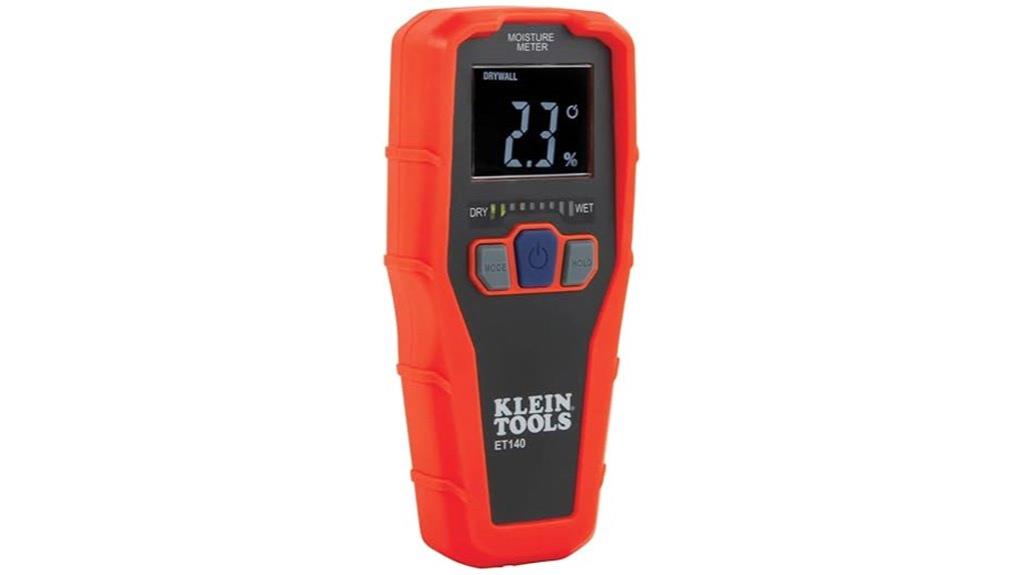
The Klein Tools ET140 Pinless Moisture Meter stands out as an excellent choice for professionals and DIY enthusiasts seeking a non-invasive way to detect moisture levels in floors and surrounding materials. It uses electromagnetic field technology to measure moisture up to 3/4 inch deep without damaging surfaces. With modes for drywall, masonry, hardwood, and softwood, it ensures accurate readings tailored to different materials. The large LCD display, LED moisture indicator, and simple controls make it user-friendly. Lightweight and durable, this tool provides quick, reliable results, helping you spot hidden moisture issues before they cause damage, mold, or costly repairs.
Best For: DIY homeowners, contractors, and inspectors seeking a reliable, non-invasive moisture detection tool for various building materials.
Pros:
- Non-destructive, pinless measurement technology prevents surface damage
- Accurate readings across multiple materials including drywall, masonry, hardwood, and softwood
- Easy-to-read LCD display with LED indicator and simple controls for user-friendly operation
Cons:
- May have difficulty measuring tight corners or edges
- Occasionally shows maximum (100%) readings that require confirmation with other methods
- Limited to 3/4 inch depth, not suitable for detecting moisture deeper within thick materials
General Tools Digital Moisture Meter with LCD Display
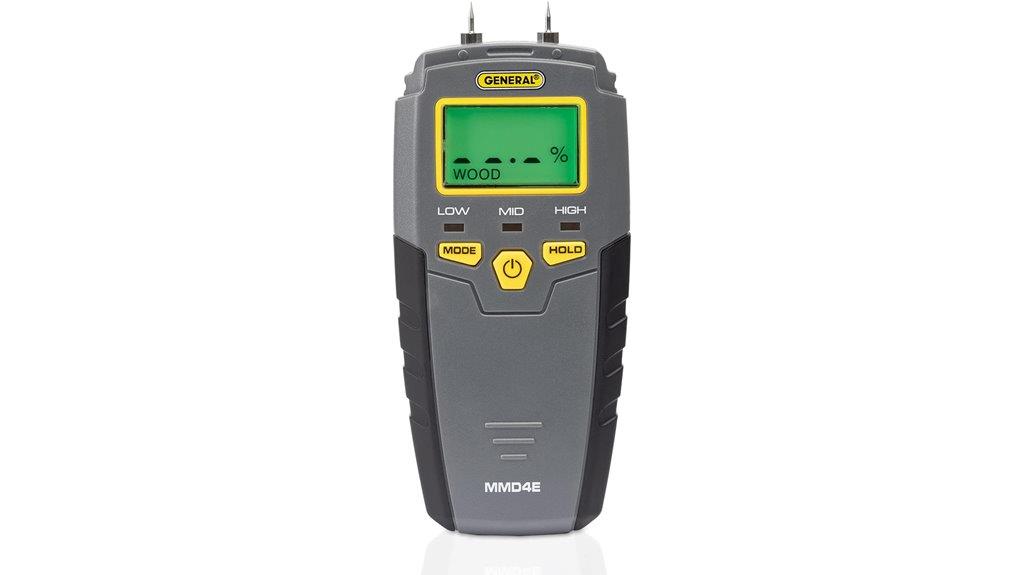
The General Tools Digital Moisture Meter with LCD Display stands out as an ideal choice for professionals and serious DIYers who need accurate moisture readings in various materials. It detects moisture in wood, drywall, concrete, plaster, and carpet, making it versatile for home inspections, leak detection, and construction projects. The device features an LED backlit LCD, stainless steel pins for precise measurements, and audible alerts for high or low moisture levels. Its ergonomic design guarantees ease of use, and it’s suitable for both amateurs and pros. With high accuracy, durability, and a budget-friendly price, this moisture meter helps ensure your surfaces are properly dried and protected.
Best For: DIYers, homeowners, and professionals who need reliable, accurate moisture readings across various materials for home inspections, construction, and leak detection.
Pros:
- High accuracy in detecting moisture levels in wood, drywall, concrete, and other building materials
- Easy to use with an ergonomic design and clear LCD display for quick readings
- Durable construction with long battery life and protective features suitable for frequent use
Cons:
- Leaves small holes in surfaces due to pin insertion, which may be problematic for finished or delicate materials
- Can be less effective on very hard or dense woods where pin penetration is difficult
- No manual included; users may need to consult online resources for detailed operation instructions
TopTes Digital Moisture Meter (TS-630) with LCD Display and Backlight
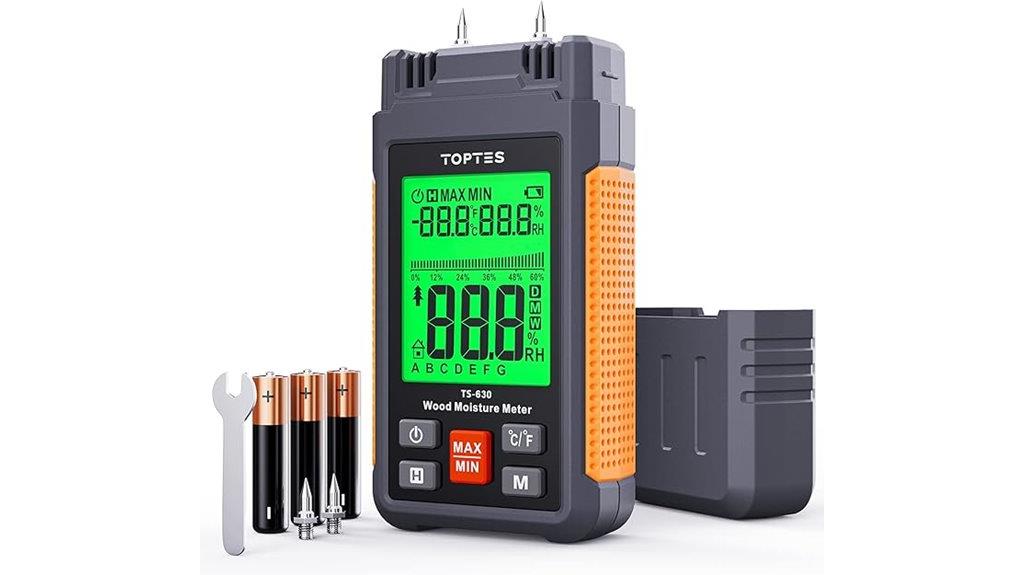
If you’re searching for a reliable moisture meter that offers clear, real-time readings, the TopTes TS-630 with LCD display and backlight is an excellent choice. This handheld, pin-type device accurately measures moisture in wood and building materials, featuring a large 2.25-inch LCD screen with a tricolor backlight—green, orange, and red—that quickly indicates dry, moist, or wet conditions. It supports multiple calibration scales from 0.0% to 57%, making it versatile for various materials. The device also includes handy functions like data hold, max/min readings, and an auto shut-off to conserve batteries. Its user-friendly interface simplifies moisture testing on floors, walls, and wood.
Best For: DIYers, woodworking professionals, and contractors who need quick, accurate moisture readings in building materials and wood.
Pros:
- Large 2.25-inch LCD display with clear numeric and bar graph readings for easy interpretation
- Supports multiple calibration scales (0.0% to 57%) suitable for various materials
- Tricolor backlight (green, orange, red) provides immediate visual indication of moisture levels
Cons:
- Pin-type design may cause surface damage if used frequently on delicate materials
- Battery life could be limited with continuous use; requires replacement of three AAA batteries
- Limited to surface testing; cannot measure moisture deeper within thicker materials
Wood Moisture Meter with Pin & Pinless Sensor, Backlit Screen, 9 Calibration
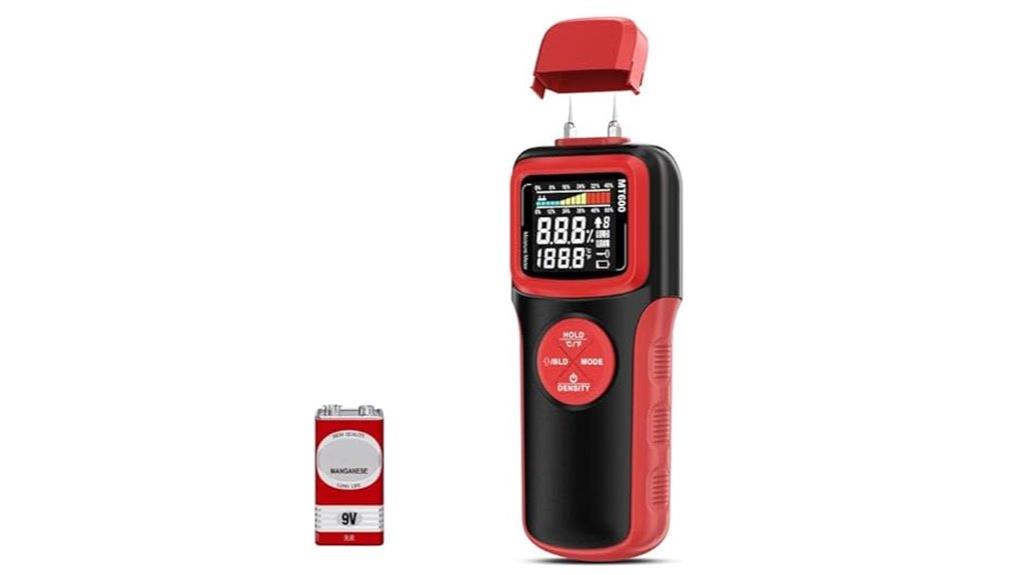
A Wood Moisture Meter with pin and pinless sensors, backlit screen, and 9 calibration settings stands out as an essential tool for professionals and DIY enthusiasts alike. It offers versatile, accurate moisture detection for wood, drywall, and concrete, with readings from 6% to 60% in wood and up to 33% in other materials. The dual sensors allow for non-destructive testing on delicate surfaces or fast pin measurements for precise results. The backlit display ensures readability in low light, while the 9 calibration settings help tailor measurements to specific wood types. Its reliable performance makes it ideal for construction, woodworking, and home inspections.
Best For: DIY enthusiasts, contractors, and woodworking professionals seeking accurate, versatile moisture detection for wood, drywall, and concrete in various environments.
Pros:
- Combines pin and pinless sensors for versatile, non-destructive and precise measurements
- Backlit display ensures easy readability in low-light conditions
- Wide range of calibration settings (9 scales) for tailored, accurate readings across different wood types
Cons:
- Some users may experience initial difficulty understanding operation or calibration procedures
- Occasional reports of units failing to power on or providing inconsistent results
- Requires careful setting adjustments depending on material type for optimal accuracy
General Tools Digital Moisture Meter MMD7NP
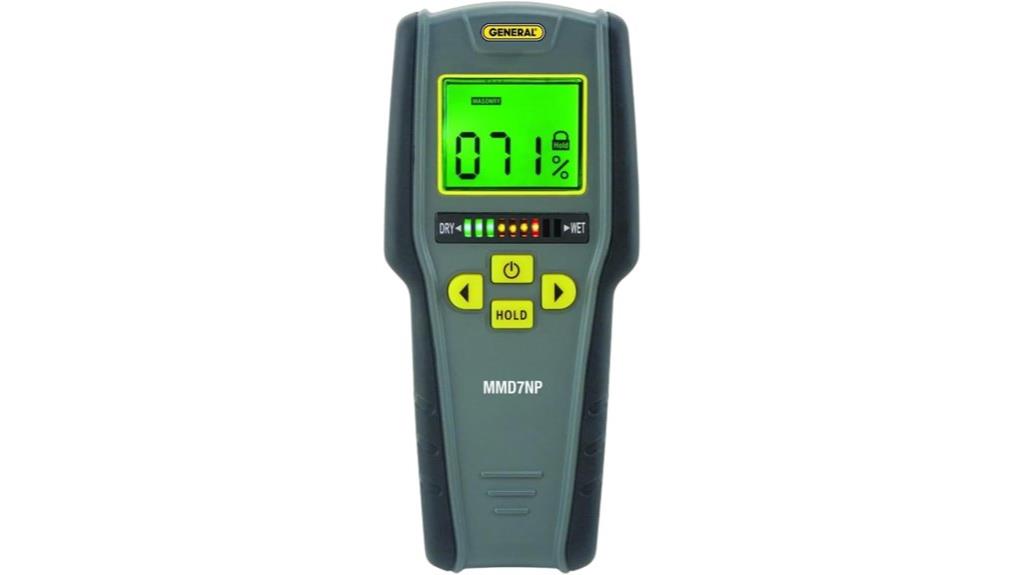
For homeowners and professionals seeking a reliable, non-invasive moisture detection tool, the General Tools Digital Moisture Meter MMD7NP stands out. It detects moisture levels in various materials, helping prevent water buildup and mold growth. Its no-pins design means no surface damage, while its broad measurement range covers softwood, hardwood, drywall, and masonry. The deep reading capability up to 3/4 inch guarantees thorough inspection. Its user-friendly features include a backlit LCD, LED bar graph, audible alerts, and auto-calibration, making moisture testing quick and accurate. This durable, compact device promotes safe, healthy environments and simplifies moisture monitoring for any project.
Best For: homeowners, DIYers, and professionals seeking a non-invasive, reliable moisture detection tool for safe and efficient water and mold prevention.
Pros:
- No-pins, non-invasive design prevents surface damage during testing
- Broad measurement range for various materials like wood, drywall, and masonry
- Deep reading capability up to 3/4 inch ensures thorough moisture detection
Cons:
- May require calibration for optimal accuracy across different surfaces
- Limited to moisture detection; does not identify specific mold or water source
- LCD display and features might be challenging to read in very bright or dark environments
RDINSCOS Pin-Type Wood Moisture Meter
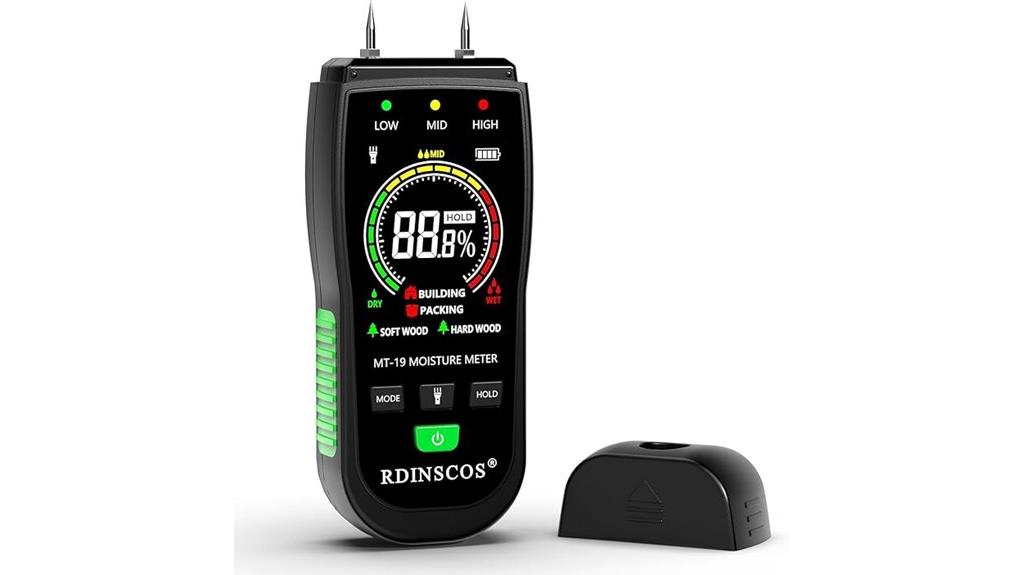
The RDINSCOS Pin-Type Wood Moisture Meter is an ideal choice for homeowners, builders, and firewood enthusiasts who need quick, accurate moisture readings in various building materials. This digital handheld device measures moisture levels in wood, drywall, and concrete up to 12mm deep, providing instant results. It features a backlit LCD screen, a hold function, and auto shut-off to save battery life. Its smart modes let you switch between softwood, hardwood, and wall settings for precise measurements. Compact and easy to use with one hand, it’s perfect for on-the-go inspections, firewood testing, or ensuring your floors are properly dried before installation.
Best For: homeowners, builders, and firewood enthusiasts seeking quick, accurate moisture measurements in wood and building materials.
Pros:
- Provides instant, accurate readings up to 12mm deep across various materials
- Easy to operate with one hand and features a backlit LCD display for visibility in low light
- Compact, lightweight, portable design with auto shut-off to conserve battery life
Cons:
- May require calibration for highly dense or unusual materials
- Limited to a 12mm measurement depth, not suitable for thicker materials
- Needs fresh batteries for optimal performance, which may require replacements over time
Kiprim Pinless Moisture Meter for Floors, Wood, Walls, Concrete
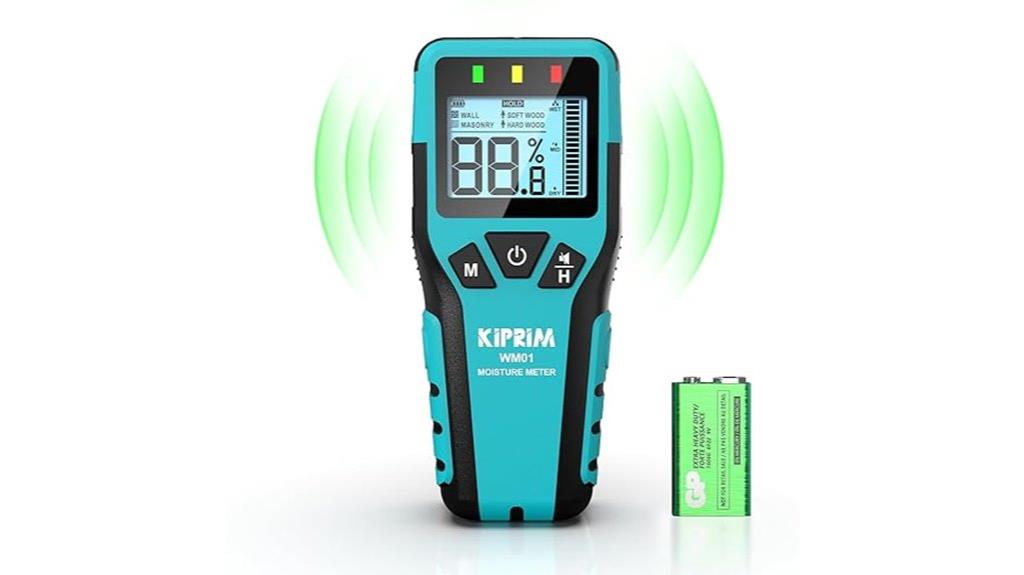
If you’re looking for a reliable, non-invasive way to measure moisture levels across various surfaces, the Kiprim Pinless Moisture Meter WM01 stands out as an excellent choice. Its compact, lightweight design makes it easy to handle during inspections of floors, walls, wood, or concrete. The device uses electromagnetic waves to penetrate up to 4 cm deep without surface damage, providing quick, accurate readings. With modes tailored for softwood, hardwood, walls, and masonry, it offers versatile measurement options. Its bright LCD display, color-coded indicators, and user-friendly interface make moisture assessment straightforward, whether you’re checking for water damage, mold risk, or proper firewood seasoning.
Best For: homeowners, DIY enthusiasts, and professionals seeking a reliable, non-destructive moisture measurement tool for floors, walls, wood, and concrete inspections.
Pros:
- Non-invasive measurement using electromagnetic waves, preventing surface damage
- Easy-to-use interface with large LCD display and color-coded indicators for quick readings
- Versatile with multiple measurement modes for different materials and simple calibration procedures
Cons:
- Limited accuracy on very thin materials or surfaces covered with water or condensation
- Not suitable for use on metallic objects or porous materials like drywall within close proximity
- Requires proper calibration to maintain measurement accuracy over time
Dr.meter Wood Moisture Meter (Pin & Pinless)
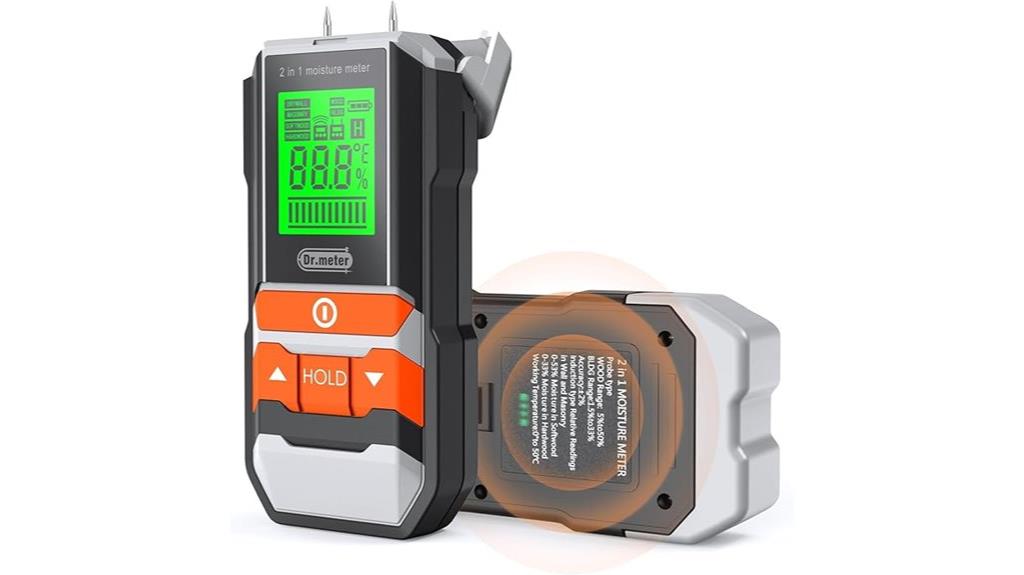
A versatile choice for professionals who need both quick and precise moisture readings, the Dr.meter Wood Moisture Meter combines pin and pinless technologies in a single device. It measures moisture in wood and building materials with high accuracy, offering fast pin-type readings and non-invasive pinless scans. The device features four preset modes for softwood, hardwood, masonry, and drywall, simplifying operation. It alerts you when moisture levels exceed critical thresholds and includes a temperature measurement function. Compact and user-friendly, it comes with a nylon storage bag, making it perfect for woodworking, construction, or leak detection projects where accuracy and convenience are essential.
Best For: professionals in woodworking, construction, and leak detection seeking accurate, versatile moisture measurement with quick and non-invasive options.
Pros:
- Combines pin and pinless moisture measurement modes in one device for versatility
- Provides fast, high-accuracy readings suitable for various wood types and building materials
- Includes temperature measurement to enhance moisture assessment accuracy
Cons:
- Error margin of ±4% in pinless mode may be less precise for critical applications
- Over-range alerts are limited to specific moisture thresholds, which may require manual monitoring for other levels
- The device’s complexity might require some user familiarity to operate all features effectively
FLIR MR160 Thermal Imaging Moisture Meter
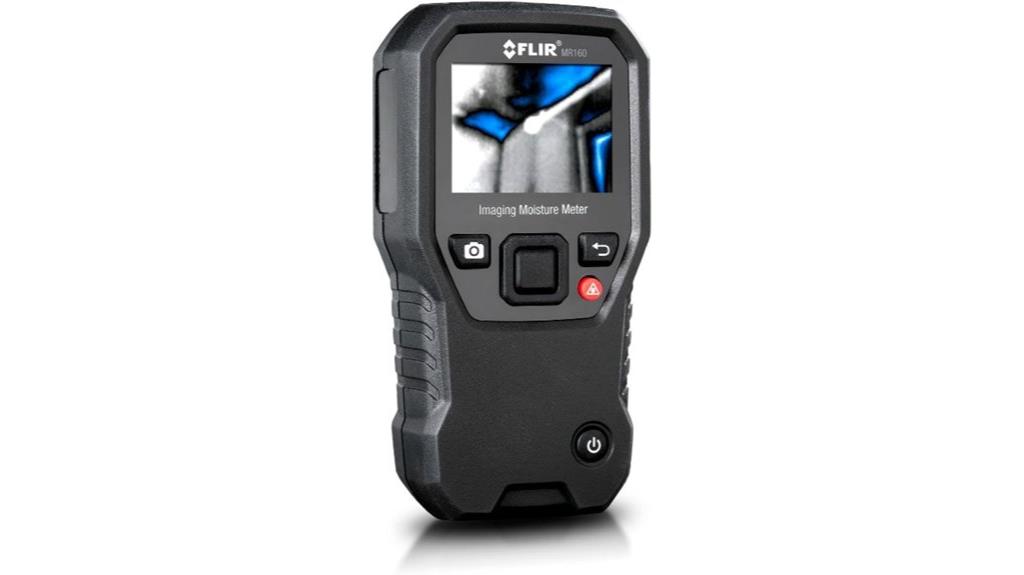
For professionals seeking quick and accurate moisture detection, the FLIR MR160 Thermal Imaging Moisture Meter stands out with its infrared guided measurement technology. It combines thermal imaging with pin and pinless options, allowing me to locate hidden moisture efficiently. The built-in thermal imager helps pinpoint problem areas without invasive testing, while the 2-inch pins enable precise contact measurements when needed. Its compact, rugged design and rechargeable battery make it perfect for fieldwork. This versatile device simplifies troubleshooting, saving time and improving accuracy. Plus, with a 10-year warranty, I can trust its long-term reliability for thorough moisture inspections in various environments.
Best For: professionals seeking a reliable, versatile moisture detection tool for quick, non-invasive inspections in construction, HVAC, or building maintenance.
Pros:
- Combines thermal imaging with pin and pinless moisture measurement for comprehensive diagnostics
- Compact, rugged design with rechargeable battery for field portability and durability
- Easy to use, enabling quick identification of hidden moisture issues without invasive testing
Cons:
- May require additional training to interpret thermal images accurately
- Higher cost compared to basic moisture meters without thermal imaging features
- Limited to specific measurement ranges, potentially less effective for extreme moisture levels
Kiprim Pinless Moisture Meter for Home Testing
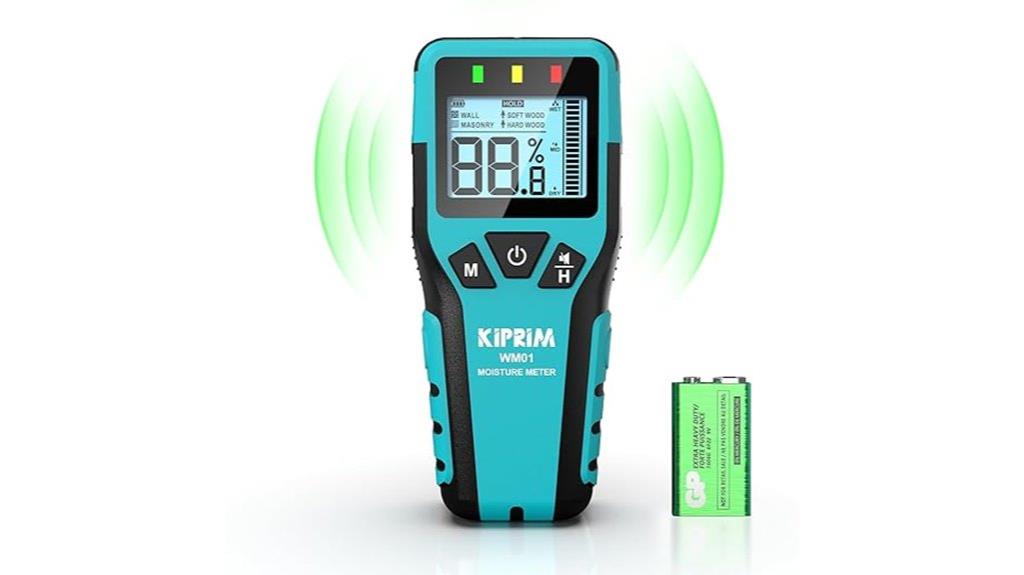
Looking for a reliable, non-invasive way to check moisture levels in your floors without causing damage? The Kiprim Pinless Moisture Meter WM01 is perfect for this. It’s compact, lightweight, and durable, with a plastic shell, luminous LCD, and antiabrasive pads. Using electromagnetic waves, it measures moisture up to 4 cm deep in materials like wood, tiles, brick, or stone—no surface damage needed. It offers four measurement modes, instant readings, and color-coded LEDs for quick assessment. Its portability, ease of use, and accuracy make it ideal for homeowners and professionals alike, especially when inspecting for mold, water damage, or moisture in construction materials.
Best For: homeowners, DIY enthusiasts, and professionals seeking a non-invasive, accurate moisture meter for detecting water damage, mold risk, and moisture levels in various building materials.
Pros:
- Non-destructive electromagnetic measurement that avoids surface damage
- Easy to operate with instant readings and clear visual indicators
- Compact, lightweight, and portable for convenient indoor and outdoor use
Cons:
- Less accurate on very thin or porous materials like drywall
- Limited to materials between 2-4 cm thickness; may be less effective on thicker surfaces
- Requires proper calibration for optimal accuracy; may need recalibration over time
Factors to Consider When Choosing Handheld Moisture Meters for Floors
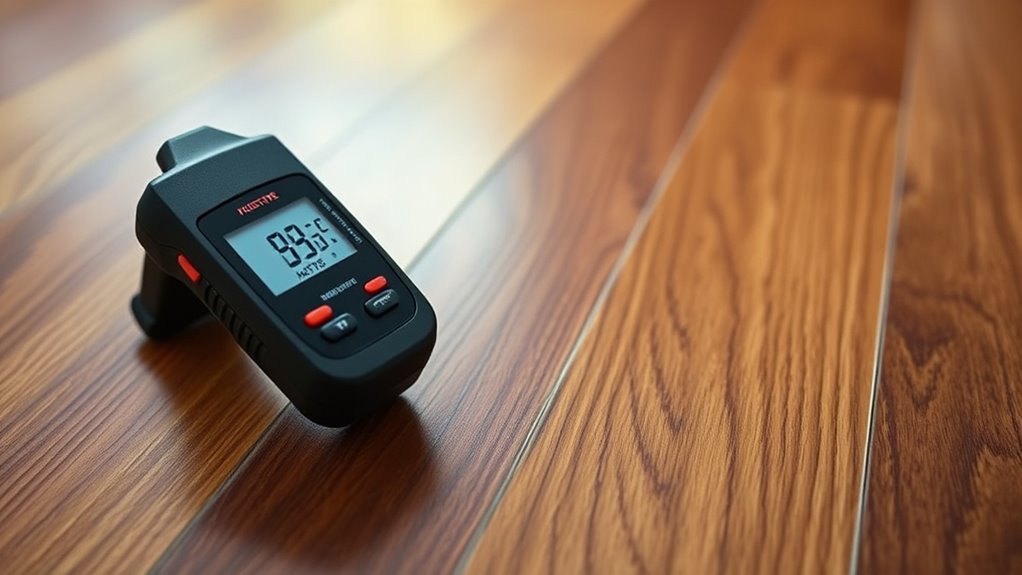
When choosing a portable moisture meter, I always consider the measurement range and accuracy to guarantee dependable readings. I also look at material compatibility and ease of use to match my specific flooring needs. Finally, I keep in mind the potential surface damage, battery life, and power needs for consistent performance.
Measurement Range and Accuracy
Choosing a handheld moisture meter with the right measurement range and accuracy is essential for accurately evaluating floor conditions. A broad measurement range helps detect both very dry and very moist materials, giving a complete picture of the floor’s moisture content. High accuracy, typically within ±1-2%, ensures reliable data for informed decisions about installation or repairs. It’s also important to to consider the device’s measurement depth—pinless sensors usually reach up to 4 cm, while pin sensors can assess moisture at around 19 mm beneath the surface. Consistent calibration and error minimization are vital for maintaining accuracy over time. Since different flooring materials have varying moisture thresholds, selecting a meter with appropriate measurement ranges tailored to your specific material is crucial for precise results.
Material Compatibility Needs
Selecting a moisture meter that’s compatible with your specific flooring material is essential for obtaining accurate readings. I always guarantee the device is calibrated for the material I’m testing, whether it’s wood, drywall, or concrete. Different materials require different measurement ranges; for example, wood can have moisture levels up to 60%, so I choose a meter that covers that range. I also consider whether I need pinless or pin-type measurements—pinless is ideal for surface testing without damage, while pins are better for deeper readings. Additionally, I look for models that support material-specific settings or calibration scales, which enhance measurement precision. Finally, I verify that the meter can measure moisture at the appropriate depth, whether surface-only or several inches deep, depending on the material.
Ease of Operation
A moisture meter’s ease of use can make a big difference in how accurately and efficiently I can test flooring materials. I look for devices with simple interfaces, minimal buttons, and clear instructions to get quick readings without hassle. Automatic calibration or preset modes tailored for different materials save me time and reduce errors. A large, backlit LCD display is essential, especially when working in varying lighting conditions, so I can easily read moisture levels. I prefer instruments that can be operated with one hand, allowing me to test in tight or awkward spaces comfortably. Clear indicators, like color-coded LEDs or visual alerts, help me interpret results instantly, ensuring I don’t need to analyze complex data. Overall, a user-friendly moisture meter boosts my confidence and efficiency on every project.
Surface Damage Risk
Since surface damage can compromise the integrity of delicate or finished flooring materials, I pay close attention to the type of moisture meter I use. Pin-type meters require penetrating the surface with pins, which can leave small holes or surface damage, especially on sensitive surfaces. In contrast, pinless meters use electromagnetic sensors to measure moisture without surface penetration, considerably reducing damage risk. However, pinless meters typically measure up to 4 cm deep, which might limit accuracy on thick or dense materials and increase the chance of surface harm if misused. For fragile surfaces like drywall or aged wood, pinless meters are safer, but I always ensure proper calibration and correct sensor placement to prevent any surface damage and obtain reliable readings.
Power and Battery Life
When choosing a handheld moisture meter for floors, paying attention to power and battery life is essential for reliable performance. Longer battery life allows me to conduct extensive testing without constantly recharging or replacing batteries, which is especially important in remote locations. Devices with high-capacity or rechargeable batteries offer a dependable power source, reducing downtime. I also consider how energy-efficient the device is; better designs mean I can get more testing done between charges. Some meters have sealed, non-replaceable batteries, meaning I’ll need a new device once the battery dies. Others feature accessible batteries, making maintenance easier. Low-battery alerts are a helpful feature, preventing unexpected shutdowns during critical inspections and ensuring consistent, accurate results.
Device Durability and Build
Choosing a handheld moisture meter that can withstand the rigors of regular use is essential for maintaining reliable measurements over time. Look for models with water-resistant or waterproof housing to handle outdoor conditions and accidental splashes. The casing material matters too—high-impact ABS plastic or rubberized coatings boost shock resistance and extend the device’s lifespan. Reinforced construction and sturdy buttons or touchscreens prevent damage from drops and frequent handling, ensuring consistent performance. Additionally, sealed battery compartments and corrosion-resistant sensors protect internal components, making maintenance easier and reducing failure risks. A robust build with protective features means your moisture meter remains functional in tough environments, giving you confidence in your readings and saving you money on repairs or replacements down the line.
Budget and Cost Efficiency
Selecting a handheld moisture meter that fits your budget doesn’t mean you have to sacrifice accuracy or durability. Prices range from under $30 for basic pinless models to over $200 for advanced multi-mode devices. It is crucial to find a balance between affordability and functionality. Cheaper meters should still provide reliable readings and sturdy build quality, ensuring long-term use without frequent replacements. Features like multiple calibration modes or pinless technology can enhance versatility and save money by handling various flooring types. To avoid overspending, consider how often you’ll use the meter and the level of precision needed. A well-chosen device with the right features can prevent costly flooring problems later, making it a smart investment that maximizes value within your budget.
Frequently Asked Questions
How Accurate Are Handheld Moisture Meters Compared to Professional Testing Methods?
Handheld moisture meters are quite accurate for quick, on-the-spot readings, but they don’t always match the precision of professional testing methods. I’ve found they’re great for screening, but for critical projects, I prefer more advanced tools like pin-type meters or laboratory tests. Still, with proper calibration and technique, handheld meters give reliable results that help me make informed decisions during flooring installations or repairs.
Can Handheld Moisture Meters Detect Moisture Behind Walls or Only Surface Levels?
Did you know that moisture can be hidden behind walls in up to 60% of hidden damage cases? Handheld moisture meters primarily detect surface moisture levels and are limited when it comes to behind walls. They’re great for quick checks but can’t accurately measure moisture deep within wall cavities. For thorough assessments, I recommend using specialized tools like pin-type meters or professional moisture testing.
What Is the Typical Lifespan or Battery Life of These Moisture Meters?
Most handheld moisture meters last about 20 to 50 hours of continuous use on a single set of batteries. I’ve found that battery life varies depending on the model and how frequently I use it. Simple models with basic features tend to drain batteries slower, while advanced ones with backlit screens or data storage use power more quickly. It’s always good to keep spare batteries handy for uninterrupted projects.
Are There Specific Models Suitable for Both Hardwood and Concrete Flooring?
Think of these meters as versatile tools, like Swiss Army knives for flooring. Yes, some models are specifically designed to handle both hardwood and concrete effectively. I recommend looking for meters with dual-pin and pinless modes, such as the Protimeter Surveymaster or Wagner MMC220. These models give you accurate readings across different materials, making your job easier and ensuring perfect results every time.
How Do Environmental Conditions Affect Moisture Meter Readings?
Environmental conditions like temperature and humidity can substantially impact moisture meter readings. I’ve found that high humidity can cause falsely elevated readings, while cold temperatures might give lower results than actual moisture content. To get accurate readings, I always ensure the area is at a stable, controlled temperature and humidity level before testing. This way, I can trust my moisture meter to provide reliable data for perfect flooring results.
Conclusion
Choosing the right handheld moisture meter can subtly elevate your flooring projects, ensuring surfaces remain in their best light. While no tool can guarantee perfection, selecting one that aligns with your specific needs can help you navigate moisture levels with greater confidence. Remember, a well-chosen meter gently guides you toward better results, making your work not just easier, but truly more refined. After all, a little attention to detail often makes all the difference.
